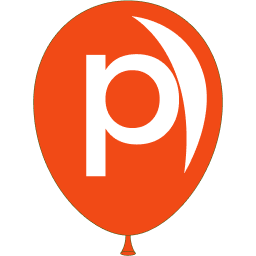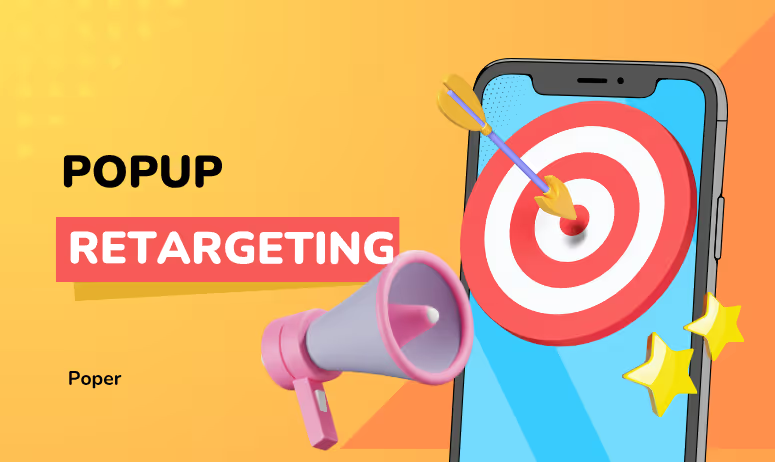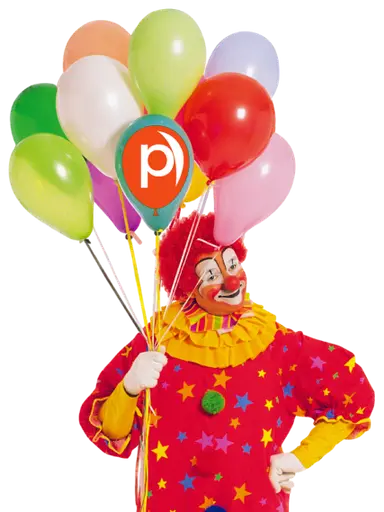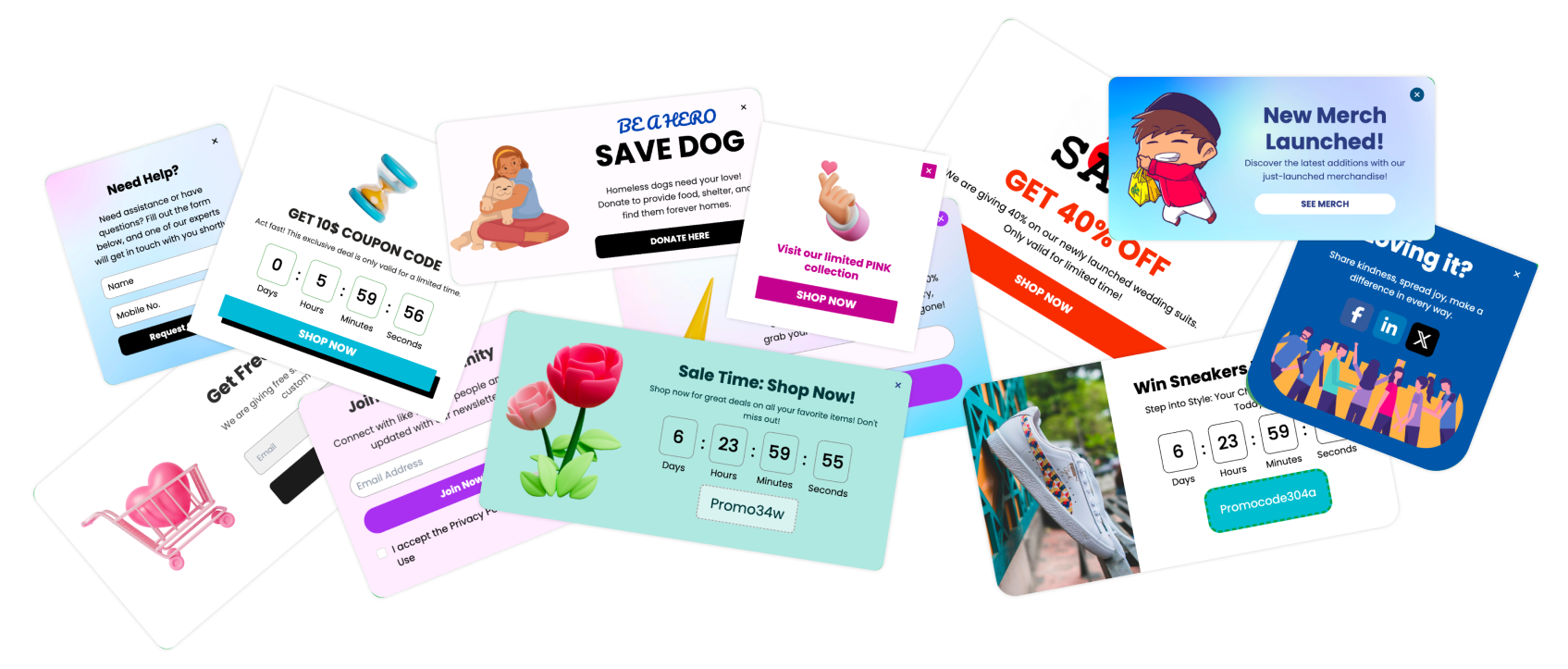“Most visitors don’t convert on their first visit. Retargeting popups make sure they come back before you lose them forever.”
Retargeting popups are one of the smartest, highest ROI tools in onsite engagement because they bring back users who already showed interest but didn’t complete an action. They act as gentle reminders, surfacing personalized messages, product views, or offers that encourage visitors to return, reconsider, and convert.
A retargeting popup is a personalized onsite message shown to users based on their past behavior, such as viewing a product, abandoning a cart, or returning to a page. These popups appear at the right moment using triggers like exit intent, scroll depth, or inactivity, helping businesses recover lost visitors, increase conversions, and boost revenue with minimal friction.
This makes retargeting popups one of the most effective ways to re engage warm leads and bring them back into the funnel.
Examples include:
“Still thinking about this item?”
“Your cart is waiting for you.”
“You viewed this yesterday — here’s a discount.”
They focus on engaged users, not random visitors.
How Retargeting Popups Work
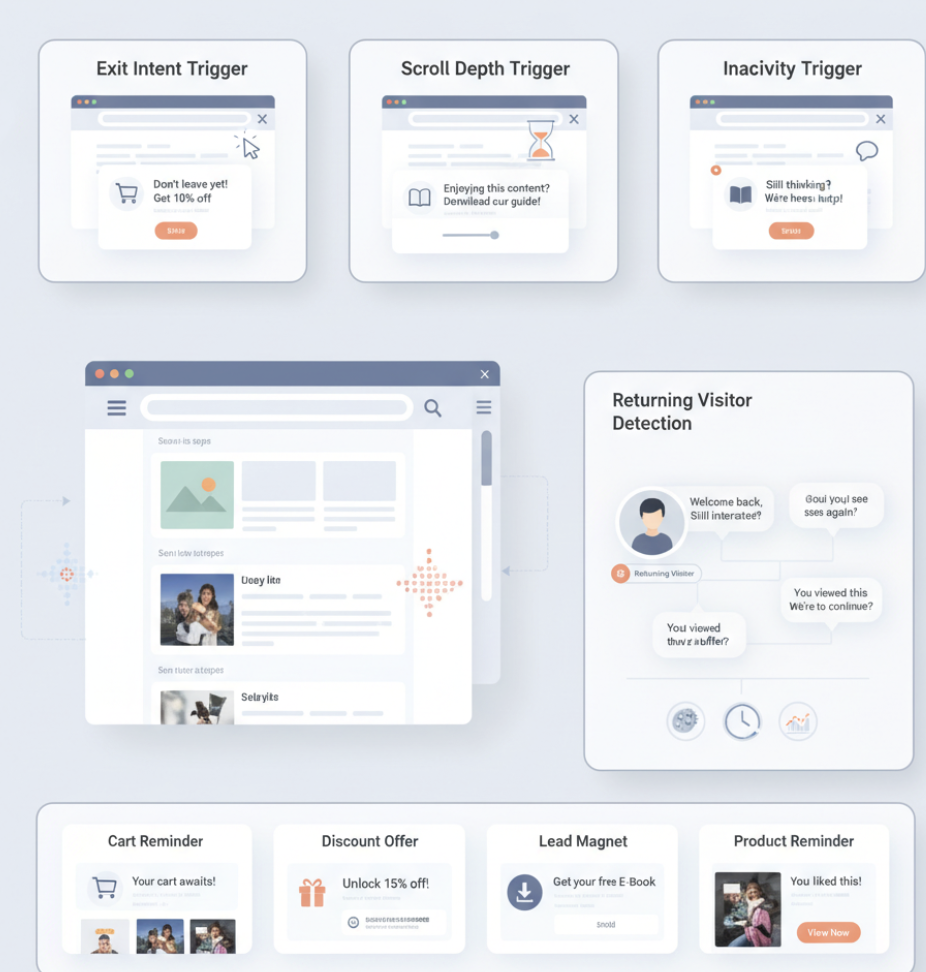
Retargeting popups are built on smart triggers, user signals, and behavioral data. Instead of appearing randomly, they show up only when the user’s actions indicate hesitation, interest, or intent. This timing makes them feel natural, relevant, and perfectly aligned with the user’s journey.
Let’s break down how they actually function.
Trigger Logic: Exit Intent, Scroll, Inactivity
Retargeting popups rely on precise triggers to appear at the right moment, such as:
Exit Intent
When the user’s cursor moves toward the close button or back button.
Perfect for:
Cart reminders
Checkout recovery
Limited time offers
Scroll Depth
Appears after the user scrolls 40 percent or 60 percent.
Ideal for:
Content retargeting
Product reminders
Lead magnet recovery
Inactivity
When a user pauses for too long on a page.
Useful for:
Re engagement nudges
“Still thinking?” popups
Price drop messages
These triggers ensure the popup shows when the user needs it most — not when they’re busy or engaged.
Returning Visitor Detection
Retargeting popups automatically detect returning users and adapt the message accordingly.
For example:
“Welcome back! Still interested in this item?”
“Good to see you again — here’s a special offer.”
“You viewed this yesterday. Want to check out?”
This works through:
Browser cookies
Session history
User actions in previous visits
Returning visitors are 2 to 3 times more likely to convert, making these popups extremely valuable.
Why Retargeting Popups Increase Conversions
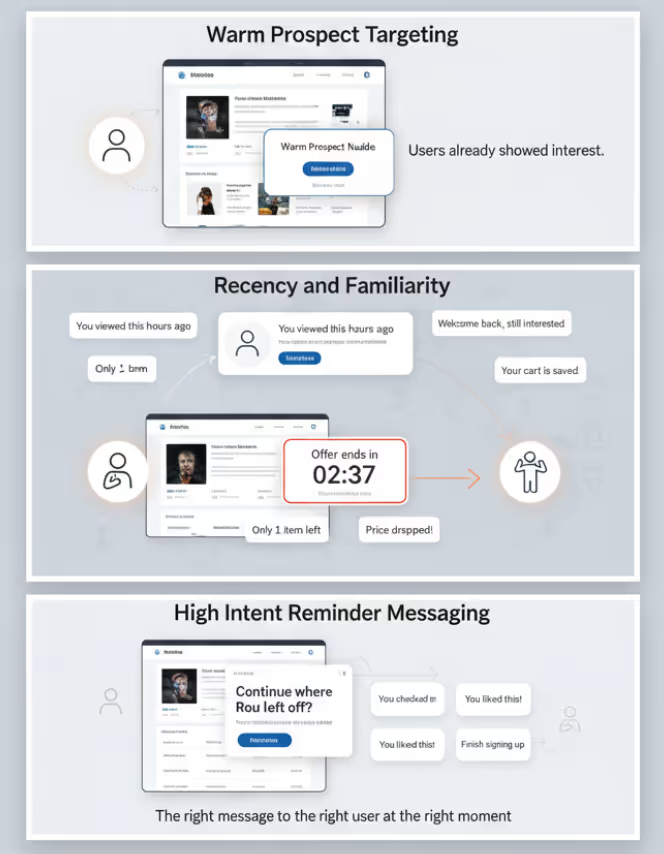
Retargeting popups are uniquely effective because they target users who already showed interest. These users are not cold traffic. They’re warm prospects who need a nudge, a reminder, or a reason to come back. That’s why retargeting popups consistently deliver some of the highest conversion rates in onsite marketing.
Recency and Familiarity Boost Action
Users who revisit your site or linger on a product are already familiar with your brand. Familiarity builds trust — and trust drives conversions.
Examples of recency based retargeting:
“You viewed this 2 hours ago — here’s a quick discount.”
“Welcome back! Still interested in this item?”
“Your cart is still saved for you.”
Because the user already interacted with your site, the popup message feels natural and relevant, not intrusive.
Loss Aversion and Urgency
Humans fear losing something more than they value gaining it. Retargeting popups leverage this psychology perfectly.
Examples:
“Your cart will expire soon.”
“Only 1 item left in stock.”
“This offer ends in 10 minutes.”
“Price dropped since your last visit.”
These messages trigger a gentle sense of urgency, helping users make the decision they were already considering.
High Intent Reminder Messaging
Retargeting popups don’t show random messages. They show reminders that match the visitor’s previous interest.
Examples:
“You checked this product — want to add it to your cart?”
“You viewed this plan — here’s a free trial to get started.”
“Finish signing up to unlock your features.”
These reminders activate latent intent — the user’s internal desire that wasn’t strong enough during their first visit.
High intent reminders convert because they show:
The right message
To the right user
At the right moment
This is why retargeting popups often convert 3 to 7 times higher than standard popups.
5 Types of Retargeting Popups
Retargeting popups aren’t one size fits all. Each user segment needs a different nudge based on where they dropped off, what they viewed, and what stage of the funnel they were in. Below are the most effective and widely used types of retargeting popups that help recover lost visitors and boost conversions.
1. Cart Abandonment Popups
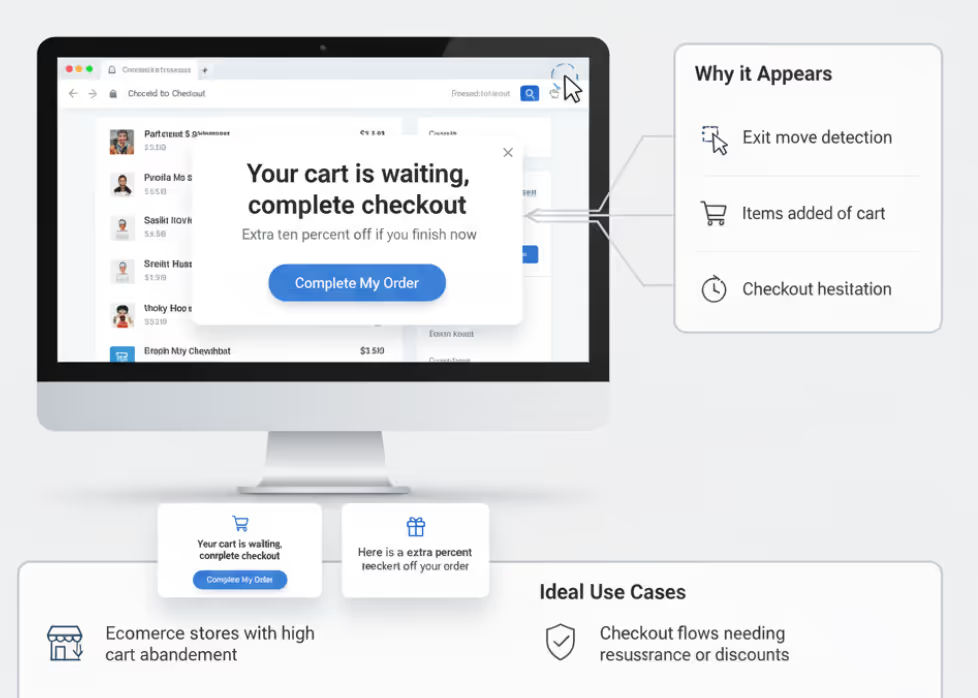
These appear when users try to leave after adding items to their cart.
Examples:
“Your cart is waiting — complete checkout?”
“Here’s an extra 10 percent off your order.”
Ideal for:
Ecommerce stores with high cart abandonment
Checkout flows needing reassurance or discounts
These popups consistently deliver the highest recovery rates.
2. Product Reminder Popups
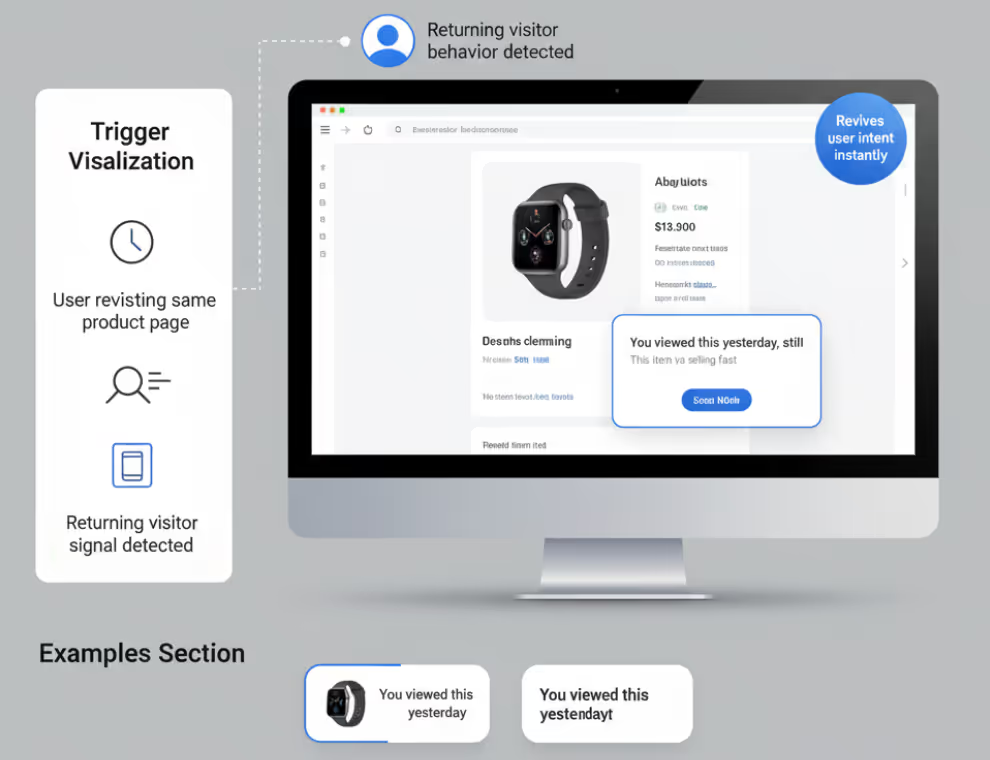
Triggered when users revisit a product page or viewed it earlier.
Examples:
“You viewed this yesterday — still interested?”
“This item is selling fast.”
Ideal for:
Shoppers comparing multiple items
Returning visitors exploring the same product again
These popups revive user intent instantly.
3. Browse Abandonment Popups
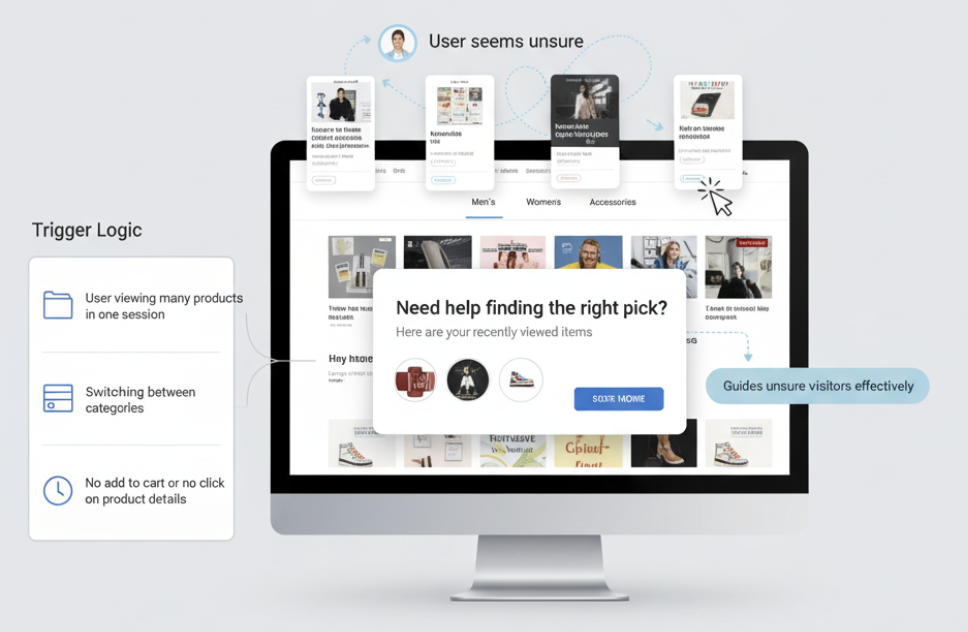
Shown to users browsing multiple products or categories without taking action.
Examples:
“Need help finding the right pick?”
“Here are your recently viewed items.”
Ideal for:
Long browsing sessions
Visitors switching between product categories
Great for guiding users who seem unsure.
4. Return Visitor Popups
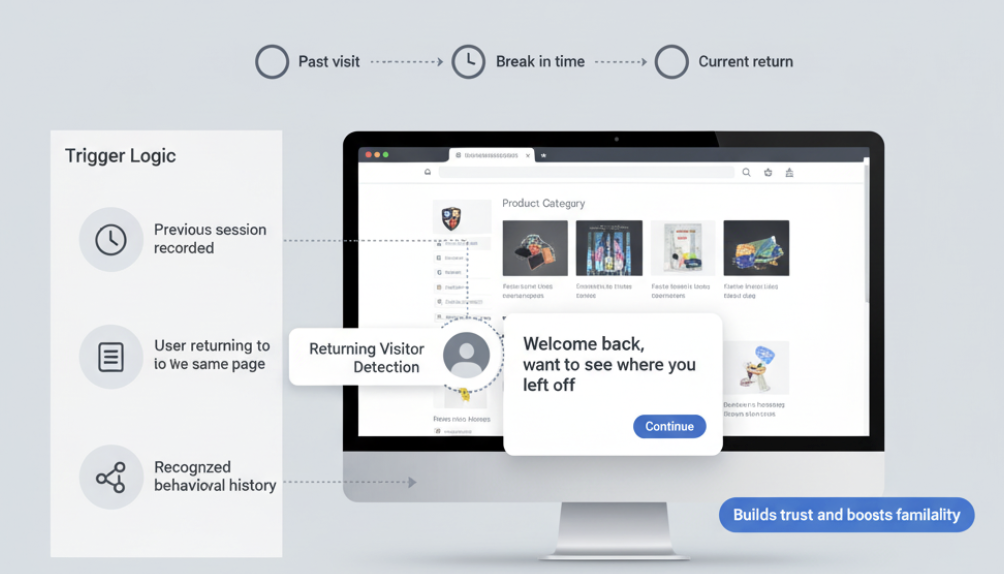
Shown only to users coming back after a previous session.
Examples:
“Welcome back! Want to see where you left off?”
“Back again? Here’s a quick offer for you.”
Ideal for:
Users who show repeated interest
Visitors in multi step decision cycles
These popups strengthen familiarity and trust.
5. Price Drop or Back In Stock Popups

Triggered when something changes about the product the user previously viewed.
Examples:
“Good news! The price dropped since your last visit.”
“This item is back in stock. Grab it now.”
Ideal for:
High demand or limited stock items
Price sensitive shoppers
These popups capitalize on timely opportunities and urgency.
Best Use Cases
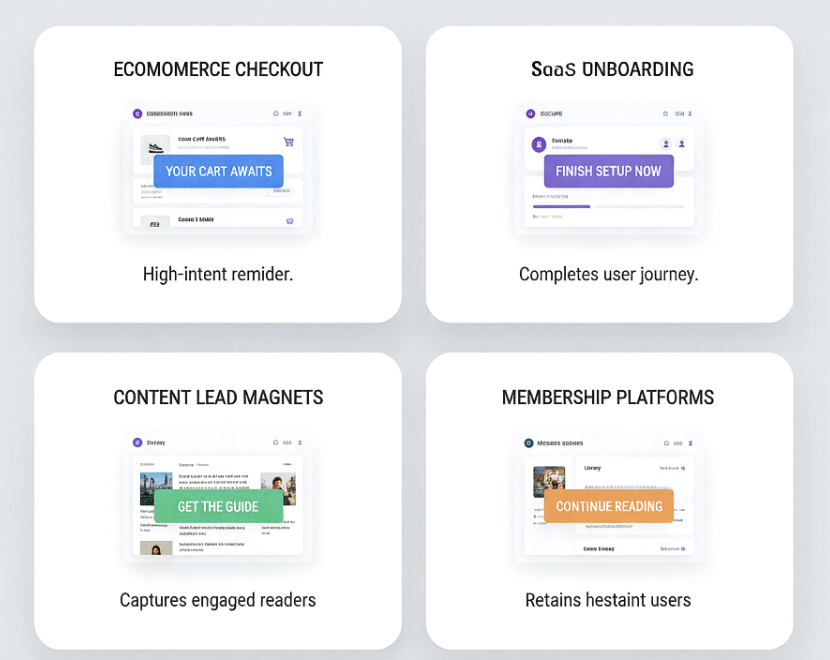
Retargeting popups aren’t just for ecommerce. They’re incredibly versatile and can be used across different industries and website types. The key is to place them where users are closest to making a decision — or where they previously showed strong intent.
Below are the most effective use cases where retargeting popups consistently deliver powerful results.
Ecommerce Checkout and Product Pages
This is the highest intent zone on any ecommerce website.
Users here are often comparing details, thinking through a purchase, or hesitating before checking out.
Perfect retargeting popups include:
“Your cart is still waiting.”
“Still thinking about this product?”
“Only 1 left in stock.”
Why it works:
These popups target users right at the decision point.
SaaS Dashboards and Onboarding
Retargeting popups in SaaS help guide users toward activation, trial completion, or plan upgrades.
Popup examples:
“Finish setting up your account.”
“You viewed the Pro plan — want to try it free?”
Why it works:
SaaS users often need nudges to complete multi step processes.
Content Sites With Lead Magnets
Blogs and content heavy websites use retargeting popups to re engage readers and convert them into subscribers.
Examples:
“Download the full guide you were reading.”
“You visited this resource — get the checklist version.”
Why it works:
Retargeting aligns perfectly with content consumption patterns.
Membership and Subscription Platforms
Membership sites rely heavily on renewals, upgrades, and re engagement.
Examples:
“You left before completing your subscription.”
“Your saved content is still here — continue reading?”
Why it works:
Retargeting helps convert curious or half committed users.
Why These Use Cases Stand Out
Retargeting popups perform best when:
Users show high intent
The decision is complex or multi step
A nudge can significantly help
The page holds emotional or financial weight
This makes them essential for high value funnel moments.
How to Create Retargeting Popups in Poper
Poper is built for behavior driven popups, making it the perfect tool for retargeting. You don’t need coding, complex setups, or extra integrations. Everything works visually, intuitively, and in real time.
Here’s how to create high converting retargeting popups in Poper step by step.
Log In to Poper.ai
Start by signing in to your Poper.ai account and accessing your dashboard. Click “Create Popup” to begin designing your subscription popup.
Choose a Retargeting Focused Template
Poper includes templates specifically designed for:
Cart abandonment
Product reminders
Return visitor popups
Special offers for repeat visitors
Price drop or back in stock alerts
Select the template that best matches your retargeting goal and brand style.
Customize the Design and CTA
Use Poper’s drag and drop editor to adjust:
Colors
Fonts
Layout
Images
CTA text
Button styling
Background graphics
Make your popup match your brand perfectly.
CTA ideas:
“Resume checkout”
“Grab the discount”
“View saved items”
“Return to product”
A strong CTA makes the action effortless.
Set Visitor and Behavior Targeting Rules
This is where retargeting becomes powerful.
Inside Poper, you can target visitors based on:
Returning user detection
Viewed product tracking
Cart status
Scroll percentage
Inactivity time
Exit intent
Session count
Specific pages visited
You can even trigger popups for:
Users who viewed the same product twice
Visitors who spent more than 1 minute on a page
Return visitors arriving from abandoned cart emails
Behavior based targeting makes each popup feel intentional and relevant.
Publish and Track Performance
Once your retargeting popup is ready, publish it with a single click.
Poper’s analytics dashboard lets you track:
Views
CTR
Conversion rate
Device performance
Page wise behavior
Trigger performance
You can also run A/B tests on:
Timing
CTA copy
Design
Offer type
This helps improve your popup performance over time.
Common Mistakes to Avoid
Retargeting popups rely heavily on timing, relevance, and user experience. When done right, they feel helpful and personal. When done wrong, they feel repetitive, confusing, or even annoying. Avoiding a few key mistakes ensures your retargeting strategy stays effective and user friendly.
Here are the most common errors and how to prevent them.
Showing the Same Popup to All Users
Retargeting should never be generic.
If every visitor sees the same popup, it stops being retargeting — it becomes a regular popup.
What to avoid:
Universal discounts
Same message for new and returning users
Generic “Sign up now” popups
What to do instead:
Personalize based on behavior
Show product reminders to product viewers
Show cart popups only to users with items in their cart
Offer discounts only to hesitant or returning visitors
Personalization is what makes retargeting powerful.
Overusing or Mistiming Popups
Too many popups = irritation.
Popups at the wrong moment = interruption.
Mistakes to avoid:
Showing the popup too early
Triggering multiple popups in one session
Showing retargeting popups on irrelevant pages
Triggering the same popup repeatedly
Better timing examples:
Exit intent
After inactivity
On return visits
After product revisit
During checkout hesitation
Good timing equals good conversions.
Generic Discounts Without Relevance
A random discount rarely converts a user who was viewing something specific.
Avoid:
“Get 10 percent off everything”
“Special offer today only” with no context
Use instead:
“Get 10 percent off the product you viewed”
“Complete your cart and save 20 percent”
“Price dropped for the item you checked”
Relevance makes the offer feel valuable.
Poor Design or Confusing CTAs
Even the perfect message can fail if the popup looks messy.
Avoid:
Cluttered layouts
Small CTA buttons
Low contrast colors
Long paragraphs
Confusing messaging
Good CTA examples:
“Resume checkout”
“View your saved items”
“Get my discount”
“Continue where I left off”
Clear, simple, and direct always wins.
Frequently Asked Questions
What is a retargeting popup?
A retargeting popup is a personalized onsite message shown to users based on their past behavior, such as viewing a product, abandoning a cart, or returning after a previous session. It triggers at the right moment to re engage and convert them.
Do retargeting popups annoy users?
No — when done right, they feel helpful.Since they’re based on behavior and timing, they appear only when relevant, making them far less intrusive than traditional popups.
Do retargeting popups work on mobile?
Absolutely. Mobile optimized popups like bottom bars, floating bubbles, and small reminders work beautifully and do not interrupt the user experience.
